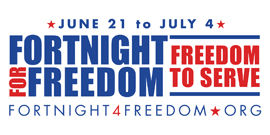Last week at the annual Spring meeting of the United States Catholic bishops, my brother bishops and I voted unanimously to continue our “ad hoc” Committee for Religious Liberty for another three years.
The fact that we need this Committee points to an uncomfortable reality — that our country’s original commitment to religious freedom is no longer certain.
To draw attention to the growing threats to our individual liberties and the freedom of the Church, the U.S. bishops are again encouraging Catholics to observe a third annual “Fortnight for Freedom,” from June 21 to July 4.
This is a time for all of us to pray for a renewal of our nation’s commitment to freedom — especially freedom of religion and conscience.
I’m reading a good new book on this subject by Cardinal Angelo Scola of Milan, “Let’s Not Forget God: Freedom of Faith, Culture, and Politics” (Image, $20).
Cardinal Scola makes the case that freedom of religion is a crucial human rights issue of our time — from the persecution of Christians in Africa, the Middle East and Asia, to the growing conflicts between religious believers and secular authorities in America and Europe.
Reading his book made me think that the Church in this country should be leading a serious new conversation about the place of religion in American culture and public life.
Religious liberty and freedom of conscience are maybe too easy to take for granted.
Many Catholics and other Americans are immigrants from countries that have no tradition of religious liberty. For many, the simple freedoms we enjoy here — to be able to pray and go to church without harassment — are freedoms they have never known in their homelands.
But religion has always meant more than prayer and worship in American culture and society.
America’s founding documents reflect an essentially religious worldview — that God is our Creator and that he guides the course of human events.
Our Declaration of Independence makes it the government’s purpose to defend the God-given rights of every human person. Religious liberty is the “first freedom” in the Constitution’s Bill of Rights, because America’s founders knew that a free society depends on having strong religious institutions and people shaped by the morality and virtues that flow from religious faith.
The question we face now as a society is whether we have “moved beyond” what our founders believed. Many people today, especially our political and cultural leaders, think we have. They believe the founders’ religious worldview is no longer relevant in our “post-modern” age.
I worry about this direction in our culture. In my opinion, if we forget that God is our Creator — and if we forget that human rights are given by God and not granted by government — then we lose the reason for fighting injustice and promoting human dignity.
In our nation’s history, much of our progress in social justice has been inspired by religious faith and built on the struggles and sacrifices of religious believers.
Christians were among the leaders in the efforts to abolish slavery and to give women the right to vote. Churches and synagogues led the African American civil rights movement and the farmworkers’ movement. It was a book by a Catholic Worker, called “The Other America,” that launched the national “war on poverty” in the 1960s. Christians formed the foundation of the pro-life movement and the peace movements.
Given this history, it is important for Catholics and other believers to take a leading role — as men and women of faith — in the debates and conversations that are shaping the direction and culture of our country.
So we need to continue this larger conversation about conscience and religion in American society.
As Catholics in this conversation, we need to remember that our faith in Jesus Christ is meant to have consequences. Not only in our own lives and in our own homes, but also in the society we live in. As Catholics, we have a viewpoint that our society needs to hear — a beautiful vision of human dignity and human society that we are called to share with our neighbors.
So during these next two weeks, this “Fortnight for Freedom,” let’s pray for one another and let’s pray for our country. Especially for our leaders.
And let’s ask our Blessed Mother, Mary Immaculate, the patroness of this great country, to help all of us to become stronger in our understanding of the importance of religion in our society.
Archbishop Gomez’s book, “Immigration and the Next America,” is available at the Cathedral Gift Shop (www.olacathedralgifts.com/immigrationandthenextamericarenewingthesoulofournation.aspx). Follow him at www.facebook.com/ArchbishopGomez.

